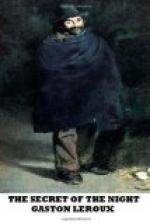She thanked the young reporter for that. Where was he? Did he remain in the pose of a porcelain statue all this time out there on the lawn? She peered through the lattice of the veranda shutters and looked anxiously out into the darkened garden. Where could he be? Was that he, down yonder, that crouching black heap with an unlighted pipe in his mouth? No, no. That, she knew well, was the dwarf she genuinely loved, her little domovoi-doukh, the familiar spirit of the house, who watched with her over the general’s life and thanks to whom serious injury had not yet befallen Feodor Feodorovitch — one could not regard a mangled leg that seriously. Ordinarily in her own country (she was from the Orel district) one did not care to see the domovoi-doukh appear in flesh and blood. When she was little she was always afraid that she would come upon him around a turn of the path in her father’s garden. She always thought of him as no higher than that, seated back on his haunches and smoking his pipe. Then, after she was married, she had suddenly run across him at a turning in the bazaar at Moscow. He was just as she had imagined him, and she had immediately bought him, carried him home herself and placed him, with many precautions, for he was of very delicate porcelain, in the vestibule of the palace. And in leaving Moscow she had been careful not to leave him there. She had carried him herself in a case and had placed him herself on the lawn of the datcha des Iles, that he might continue to watch over her happiness and over the life of her Feodor. And in order that he should not be bored, eternally smoking his pipe all alone, she had surrounded him with a group of little porcelain genii, after the fashion of the Jardins des Iles. Lord! how that young Frenchman had frightened her, rising suddenly like that, without warning, on the lawn. She had believed for a moment that it was the domovoi-doukh himself rising to stretch his legs. Happily he had spoken at once and she had recognized his voice. And besides, her domovoi surely would not speak French. Ah! Matrena Petrovna breathed freely now. It seemed to her, this night, that there were two little familiar genii watching over the house. And that was worth more than all the police in the world, surely. How wily that little fellow was to order all those men away. There was something it was necessary to know; it was necessary therefore that nothing should be in the way of learning it. As things were now, the mystery could operate without suspicion or interference. Only one man watched it, and he had not the air of watching. Certainly Rouletabille had not the air of constantly watching anything. He had the manner, out in the night, of an easy little man in porcelain, neither more nor less, yet he could see everything — if anything were there to see — and he could hear everything — if there were anything to hear. One passed beside him without suspecting him, and men




